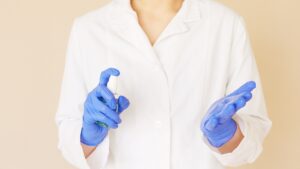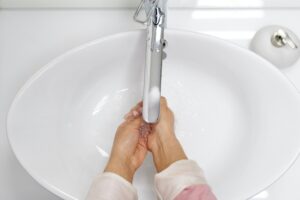Handwashing helps prevent the spread of transmissible illnesses. A majority of contagious illnesses are spread from one person to another by contaminated hands. These illnesses include gastrointestinal infections, such as salmonellosis, and respiratory infections, such as influenza, colds, and coronavirus. Washing your hands properly with soap and water can help prevent the spread of the germs that cause these diseases.
Hospital patients are especially at risk of developing infections, notably when they have a surgery or are receiving medicines or fluids through a tube into their body. Having clean hands is the most effective way of ensuring we do not pass on infections that could enter the patient’s body through a wound or tube entry point.
Everyone who enters healthcare facilities are usually signposted to use the sanitising areas around hospitals or social care settings. This is to encourage us to keep as clean as possible near patients to stop the spread of infection.
So, when should we wash our hands?
It’s imperative for people that work in healthcare settings to maintain hygiene by washing their hands and changing gloves between patients.
How often should staff wash their hands?
- Every time they have direct contact with a patient
- Before handling food
- After helping patients use the toilets or other bathroom facilities
- Using the restroom themselves
- Before any procedures
- After any risk to the exposure of bodily fluids
- After touching any patient surroundings, such as bed rails or bedside tables.

Patients and family members entering the hospitals or healthcare settings are just as liable to maintain the standards of handwashing and sanitizing in order to prevent the spread of illnesses, diseases and so forth.
When should patients/ family members wash their hands?
- Before eating food
- When arriving and leaving any healthcare facility
- After using the bathroom
- Before touching food
What happens if we don’t wash our hands?
You will find that a lot of people frequently touch their eyes, nose and mouth without even realising it. Germs can enter the body through these places and make us sick. Germs also can travel from dirty hands into foods and drinks while people prepare or consume them. Germs from unwashed hands can be transferred to other objects such as handrails, table tops or toys, and then transferred to another person’s hands. Removing germs through handwashing therefore helps prevent bugs such as diarrhoea and respiratory infections and may even help prevent skin and eye infections.
Best things to use when washing hands
Alcohol based hand sanitisers are effective against some illnesses such as coronavirus however they are not effective against gastroenteritis. Sanitizers can rapidly reduce the number of germs on hands in many situations. However, they do not get rid of all types of germs. Hand sanitizers might not remove harmful chemicals from hands like pesticides and heavy metals.
Washing hands with soap and water is the safest way to prevent infections. Soap and water is found to be better than using anything else the chance as it lessens the chance of infection or spreading germs or diseases. If soap and water is unavailable, use alcohol-based hand sanitiser containing at least 60% alcohol which will help fight bacteria and germs.
Once you have washed your hands you need to make sure you dry them properly. Hands that have not been dried properly are more likely to have skin damage and risk infection. You risk the chances of developing dermatitis when leaving the skin dry. Wet hands are also more likely to be contaminated, as organisms are transferred more effectively on wet surfaces.
How to wash your hands properly

When in a healthcare environment, whether you’re a medical professional, patient or carer, you must always wash your hands properly. In most hospitals or GP surgeries, you will find a poster on the walls and in the toilets showing you the routine of how to wash your hands properly. You must:
- Wet your hands with clean running water, turn off the tap and apply soap
- Lather your hands by rubbing them together with the soap. Lather the backs of your hands, between your fingers, and under your nails
- If possible, remove rings and watches before you wash your hands, or ensure you move the rings to wash under them, as microorganisms can exist
- Rinse well under running water and make sure all traces of soap are removed
- Dry your hands using a clean paper towel or air dry them
- It is best to use paper towels or single-use cloth towel
- Dry under any rings, as they can be a source of future contamination if they remain moist
- Hot air driers can also be used
Conclusion
The process of washing your hands is so little compared to what could happen if you did not. We continue to wash our hands to stop spreading illnesses and diseases. It is important everyone does this to enable the safety of others using health and social care services.

